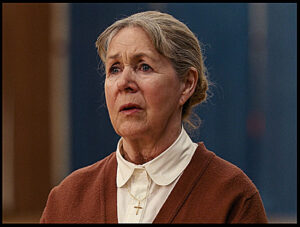
Writer/ director Portia A Buckley told David Hennessy about her short film Clodagh which is set to screen at the prestigious Tribeca Film Festival in New York.
Award- winning film maker Portia A Buckley grew up with England while spending much time in Ireland.
She has family in Waterford and most of her films up to now have been shot in the Cork/ Waterford area.
The latest of these is Clodagh which is screening at the esteemed festival Tribeca in New York.
The short film follows Mrs Kelly, a lonely, devout, and rigorously honest housekeeper, played by Bríd Ní Neachtain, who discovers a young Irish girl with an exceptional gift, Clodagh (Katelyn Rose Downey).
But this meeting creates a moral conundrum for Mrs. Kelly.
The film co-stars Aidan O’Hare (Jackie, The Wind That Shakes The Barley, Sisters Brothers) and Jim Kitson.
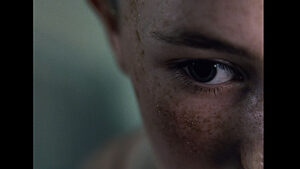
What inspired Clodagh? “Mike (Michael Lindley) and I wrote it together.
“Michael’s uncle is actually a priest in Warrington and we were very interested in these ladies, these priests’ housekeepers.
“These women of service who are not centre stage and they’re on the periphery but they kind of enable everything to run smoothly.
“We started looking at archival stuff on RTE and when we looked it up, we found this archival video of this priest’s housekeeper.
“It was about a four minute clip, very old school and she was being interviewed and the interviewer kept wanting her to say that she was the gatekeeper of this priest, she just refused and just said, ‘No, I am facilitator, I’m an enabler, I’m making sure all the community can see him’.
“She wouldn’t say a bad word about her priest.
“She was incredibly loyal.
“The whole interview was lovely.
“What was quite sweet was she was very modest in her character but she was wearing a purple-y jumper and it had little sequins.
“We love this idea that she had got dressed for this interview and that there was this creative heart beating underneath this kind of very serious exterior.
“That’s sort of how the whole thing started.
“We were interested in this character, and then we thought, ‘What could come into her life and bring sort of excitement and artistry and something slightly otherworldly and different from her own kind of regime?’
“And that is what we found with Clodagh and the Irish dancing.”
So then you developed the idea of this young girl looking for something to get involved in..
“Yeah, and what we were particularly interested in with the Irish dancing, because there’s this sean-nós dancing which is the original older form of dancing which was much more free in a way and the arms would move.
“We have been told that when the church took hold of the dancing, it became the hands down Irish dancing that we know now because of this idea that if you moved your hands, you might brush up against someone which would invite impure thought.
“We liked the idea in our own back story that Mrs. Kelly would know all of this and obviously the whole film was about her moral conundrum and her coming to a crossroads in her life.
“It’s about decisions and choices and I guess leaps of faith, but the practices that we all kind of are brought up in, and Clodagh’s dance is in the sean-nós style, and that would also be a moral conundrum for her with the church.
“Bríd was unbelievable to work with.
“As was Katelyn.
“We didn’t know when we auditioned her but that she’s a two time world Irish dancing champion.
“She’s the real deal.”
Irish dancing is so visual but surprisingly been rarely been featured prominently in cinema..
It features here and there but never to the forefront of the story, not as far as I can remember anyway…
“Me neither. And actually, it also surprises me because obviously visually, it’s so cinematic but also the sound of it is so emotionally stimulating.
“I remember when we auditioned the girls at first hearing all their shoes and being in the space with them, I was completely overwhelmed.
“I also think it’s kind of interesting because with Riverdance, Irish dancing is big in America now.
“I don’t think it has got enough attention anyway, but we hope to develop the short Clodagh into the feature so hopefully there’ll be a bit more of it.”
I thought it could be a longer story, so that’s the intention?
“Yeah, we felt that we gave so much to Mrs. Kelly, so much more than we had even considered and we loved the dynamic with her and Mr. Hickey, played by Jim Kitson.
“We felt that you could explore those characters further and they would make a nice trio going on an adventure together.”
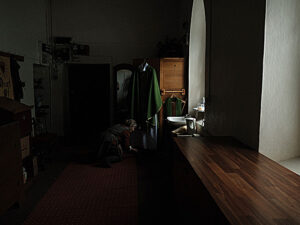
Let’s talk about Katelyn. It seems like there is a real rich crop of young Irish actors- such as Alisha Weir of Matila and Catherine Clinch of The Quiet Girl- and you have found another one here..
“We were exceptionally lucky with this whole project.”
Portia was put in touch with the revered Watson Twin Academy in Dublin.
“We were actually just looking for the class, the dance girls. It wasn’t specifically Clodagh we were looking for because we were thinking that was going to be a much more complicated search.
“We gave a breakdown and they said, ‘Oh, we have the girls, come and see them. And my daughter Katelyn would be perfect for the role of Clodagh’.
“Everyone always says their daughter will be perfect for the role so we thought, ‘Oh God, how’s this gonna work out?’
“So we go down to the Watson Twin Academy and we watch the girls that you see in the class dance.
“They’re all so brilliant and there’s this girl quietly sitting kind of to the left, not dancing and we think, ‘That’s the daughter then’.
“And she then came up, seemed quite shy- Danced like an absolute dream, just so incredible.
“And then we thought, ‘Gosh, she’s got to read now’.
“And we sort of wanted to almost put it off.
“We said, ‘Oh, do you know your lines?’
“And she said, ‘Yes’.
“We hadn’t realised that she’d been in Nun 2 and The Princess.
“We didn’t realise that she was a total pro.
“Anyway, she read and she read so beautifully and so subtly.
“She was literally the first person we saw for the role and we gave her the role then and there.
“Normally we will audition 40 or 50 people and with Bríd who’s obviously spent her whole life working in theatre and films, the two of them were a great team together.”
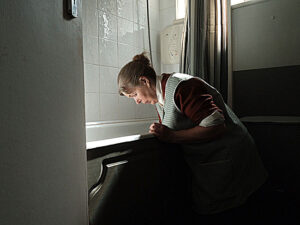
You did get lucky not only with Katelyn but also with, as you say, Bríd who originated a role in Dancing at Lughnasa and has had such a great career..
“I know and she was such a joy to work with.
“On set, she’s the most professional person I’ve ever worked with.
“She’s always focused.
“I’ve never worked with an actor with the amount of respect which he held for also all the other cast members but also all the crew.
“She was captain of that ship really, she’s the protagonist and she was so charming with everyone.
“She’s incredible.
“She was amazing and we would love the opportunity to work with her again.”
I also noticed- although he only features very briefly- Aidan O’Hare who is a great actor of many things such as The Wind That Shakes the Barley, Dead Still and also KIN. He’s always a class act..
“Yeah, he’s wonderful.
“We’ve worked with him before and when we worked with him before last time, he had just come off Jackie with Natalie Portman and he had quite a big role in that.
“I produced a film that Michael, my partner, directed which was called God’s Own Children, and Aidan played the priest in it and ever since that moment, we’ve wanted to work with him again.
“And he was very charming because obviously it’s a little part in Clodagh but he brought a lot to it. He was very charming in agreeing to do it.
“He’s someone else who we would love to continue working with.”
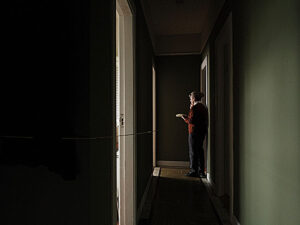
He does bring a lot to it. I think his appearance brings more depth to Clodagh and the dilemma that Mrs Kelly finds herself in..
“It’s clear that he’s wrecked himself.
“He’s tired.
“Clodagh is slightly different to the other girls in the class and I think that’s part of it.
“She is sort of an outsider and Mrs. Kelly doesn’t necessarily want to let her in predominantly because she’s a rule abiding woman but also there’s a bit of her that is probably looking down her nose at them a little bit until the moment that she shines.
“But yeah Aidan, as you say, he does give so much depth to Clodagh because he kind of is the backstory in a way and also I love him as a character because he’s really fighting for his daughter as well.”
You say Katelyn was sitting to the side away from the other dancers when you first saw her, that was very much like in the film wasn’t it? Clodagh watches the others dance and appears shy until she gets her chance to dance and she comes to life..
“Totally, and also the trepidation of her waiting her turn and then being able to come up and perform like that.
“She’s a lovely girl and she’s quite shy- Well maybe she’s not shy but she’s very softly spoken but then as soon as the camera’s on, like lots of actors, she really, really belongs on screen.
“That’s what we felt about even finding Katelyn to play Clodagh and the whole thing about the film and discovering something and embracing it, the whole thing felt kind of slightly meta.
“It was amazing even being in that hall.
“All the cast and crew, if people were off doing something else they would want to come in to see her perform.
“She’s incredibly fit as well.
“It wasn’t one take.
“She always did it perfectly but you end up getting the dance from different angles and I’d say, ‘You okay, do you need a break?’
“And she’s like, ‘No, no, just a little bit of water’.
“It’s seriously challenging what she was doing.”
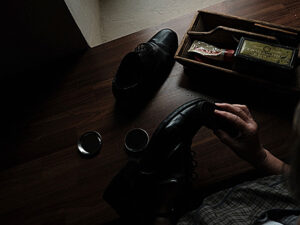
With an Irish father and an Italian documentary making mother, Portia studied art history at The Courtauld.
“My mother was a documentary filmmaker.
“She used to work for the BBC and Channel Four and made films about human rights issues so it was always in my mind since I was a young kid really.”
She did a masters in photography, film and contemporary art.
“Whilst I was there, I was looking at a lot of films but It was all academic.
“I just thought, ‘Oh God, I want to make a film’.
“Then I applied to America to do my MFA in writing/ directing at Tisch which is part of NYU which is the most amazing school and luckily I got in and spent five years there.”
You trained in New York and now the film is going back to New York..
“It’s very exciting because we were always going to move back from New York at some point but with COVID and everything, everything was kind of premature.
“So it’s very sweet that we get to go back to the city that means so much to us.
“It feels good going back with a piece of work that New York has a big bit of responsibility for the fact that this film was ever even made.
“We can’t wait to do that.”
I have been watching some of your other work in particular Radiator, the short film about a reformed drug addict who gets led astray once again by a bad influence.
It reminded me of Adam & Paul the early one form Lenny Abrahamson and Darren Aronofsky’s Requiem for a Dream, were you influenced by either of those?
“I am (a big fan of Lenny Abrahamson) but I actually only saw Adam and Paul after Radiator because at film school you’d have to read out share your work and everyone’s going, ‘Adam and Paul, Adam and Paul’.
“I didn’t want to watch it because it can affect what you’re doing if something’s too similar.
“I watched Requiem for a Dream whenever it came out.
“I remember that film.
“I don’t know whether I was thinking about that film in relationship to Radiator but I remember being profoundly affected by that film.
“It probably is very much part of it unconsciously because that film was brilliant.”
These are exciting times for Irish film.
“We were at Cleveland Film Festival and actually we were thrilled because we ended up winning an award there.
“There was a Q & A after the film and they were obviously a predominantly American audience and they said, ‘What’s happening in Ireland?’
“They thought that the cast were so talented.
“They said all this stuff is happening in Ireland and it is amazing.
“There’s so much talent in Ireland to work with.
“We didn’t discover Katelyn, obviously, she’d been discovered before that.
“But for us, it was a discovery for us finding someone that could dance like a dream, like the world champion that she is and act.
“People used to always say, ‘So you found Katelyn and then you wrote the script’.
“We were like, ‘No, no. We wrote the script and then we had to find a dancer and a fiddle player who could act’.
“There’s so many great films coming out of Ireland.
“There have always been really but it feels like there’s a new kind of injection of energy there.
“And it’s great because the more films that are made there, the more films that it promotes to be able to be financed to be made there as well.
“I think it’s a really exciting time.”
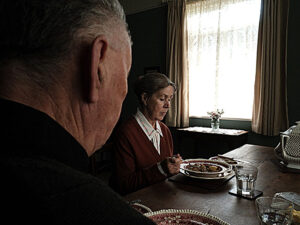
Is it the outsiders, people who are somehow isolated from society, that interest you in your work?
“I think what we’re interested in telling stories about are people that you don’t normally see on screen.
“They’re always character led projects but on sort of strong female characters that aren’t the normal characters you necessarily see on screen.
“I think with Radiator, that was sort of around the fears and anxieties people have when they’re in relationships with addicts of people being dragged back in and what a kind of fragile ecosystem that can be.
“At the end of that film, I know it’s kind of sad ending but I feel like the hope that he now has the choice, he’s just made the wrong decision again.
“Declan has the choice to make a decision.
“I guess in a similar way, it’s about second chances and people coming to a crossroads and embracing kind of the unknown.
“I think it’s interesting to put characters into situations that they obviously don’t feel comfortable in but they can gain something for themselves, even if it’s just emotionally, really getting to kind of experience bringing someone else into their lives.
“All films one level are about character and crossroads and making decisions.
“That’s part of the character arc and how that propels the narrative but we always want the decisions to be coming from the characters, rather than it being kind of a plot device.
“But I think you’re right, it’s characters that you don’t normally get an opportunity to see and then really exploring those characters.”
Clodagh screen at Irish Film Festival London (13- 17 November).
Clodagh screens as part of the Saturday shorts programme which is 2.30pm Saturday 16 November at the Institute of Contemporary Arts (ICA).
For more information and to book, go to iftuk.com.



